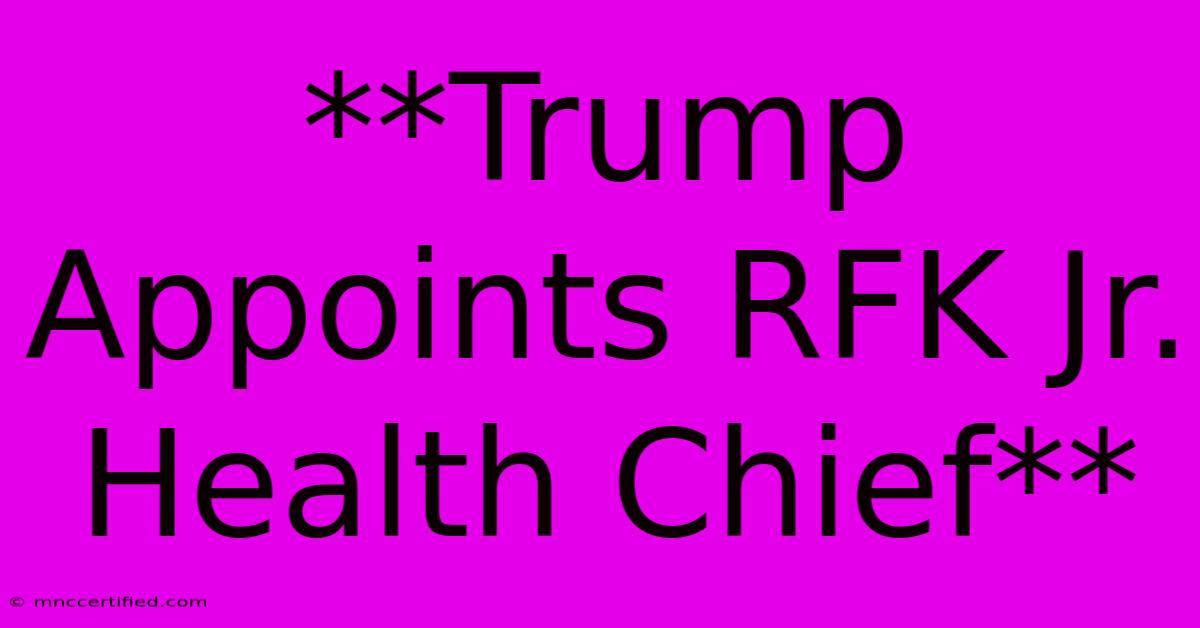**Trump Appoints RFK Jr. Health Chief**

Table of Contents
Trump Appoints RFK Jr. Health Chief: A Controversial Choice Sparks Debate
On [date], former President Donald Trump appointed Robert F. Kennedy Jr., a prominent anti-vaccine activist, to lead a newly formed "Health Freedom Task Force." This appointment has sparked significant controversy and ignited a heated debate about the potential impact on public health policies.
Who is Robert F. Kennedy Jr. and Why is This Appointment So Controversial?
Robert F. Kennedy Jr., a prominent environmental lawyer and nephew of former President John F. Kennedy, has long been a vocal critic of vaccine safety. He has repeatedly promoted unfounded claims about the dangers of vaccines, linking them to autism and other health issues. His stance has earned him notoriety and a large following among anti-vaccine groups, but it has also drawn intense criticism from medical experts and public health officials.
The scientific consensus overwhelmingly supports the safety and efficacy of vaccines. The World Health Organization (WHO) and the Centers for Disease Control and Prevention (CDC) have repeatedly emphasized the importance of vaccination in preventing potentially deadly diseases.
Why the controversy?
- Misinformation and Conspiracy Theories: Kennedy has spread numerous false claims about vaccines, including the unsubstantiated belief that they cause autism.
- Erosion of Public Trust: His appointment could further erode public trust in vaccines and contribute to a rise in vaccine hesitancy, potentially leading to a resurgence of preventable diseases.
- Potential Impact on Public Health Policies: Kennedy's influence on the task force could lead to the promotion of policies that undermine evidence-based public health practices.
The Task Force's Purpose and Concerns
The "Health Freedom Task Force" is intended to "investigate and address potential threats to the health of Americans." While the specific focus of the task force remains unclear, the appointment of Kennedy raises concerns about potential biases and the dissemination of misinformation.
Key Concerns:
- Prioritizing Ideological Beliefs over Scientific Evidence: The task force may prioritize ideological beliefs about vaccines over scientific evidence, potentially leading to misguided policies.
- Undermining Public Health Initiatives: The task force's activities could undermine ongoing public health initiatives aimed at promoting vaccination and preventing the spread of infectious diseases.
- Amplifying Anti-Vax Sentiment: The task force's existence could further legitimize the anti-vaccine movement and amplify its message, leading to a decline in vaccination rates.
What This Means for Public Health
The appointment of Robert F. Kennedy Jr. to lead a health task force is a significant development with far-reaching implications for public health. It is crucial to remain vigilant and to rely on reputable sources of information about vaccines and public health.
Key Takeaways:
- Vaccines are safe and effective. The overwhelming scientific consensus confirms the importance of vaccination in preventing serious diseases.
- Critically evaluate information sources. Be wary of information from unreliable sources and rely on evidence-based information from reputable organizations like the WHO, CDC, and medical professionals.
- Advocate for evidence-based policy. It is crucial to support policies that prioritize public health and evidence-based practices.
The appointment of Robert F. Kennedy Jr. to lead a health task force is a stark reminder of the importance of critical thinking and the need to counter misinformation about vaccines and public health.

Thank you for visiting our website wich cover about **Trump Appoints RFK Jr. Health Chief**. We hope the information provided has been useful to you. Feel free to contact us if you have any questions or need further assistance. See you next time and dont miss to bookmark.
Featured Posts
-
Latin Grammys 2024 Live Updates
Nov 15, 2024
-
Eagles Dominate Commanders In Nfc East
Nov 15, 2024
-
Italy France Win Nations League Matchday 5
Nov 15, 2024
-
Coote Video Uefa Investigates Premier League Incident
Nov 15, 2024
-
Venezuela Vs Brazil Score And Highlights
Nov 15, 2024